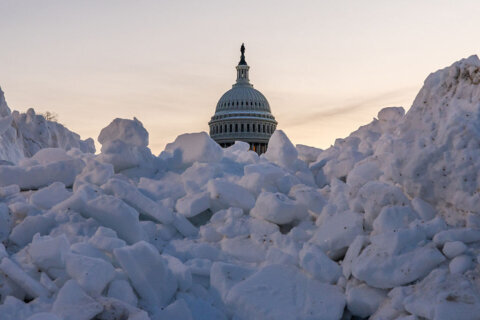For years, environmentalists have pointed to the impact agriculture in both Maryland and Pennsylvania has had on the Chesapeake Bay. On the 50th anniversary of the Clean Water Act, they lament awareness hasn’t resulted in action.
“You can’t talk about water quality without talking about agriculture,” said Eric Schaeffer, executive director of the Environmental Integrity Project and a former Director of Civil Enforcement at the Environmental Protection Agency.
“In the Bay watershed, 42% of the nitrogen, 55% of the phosphorous, and 60% of the sediment … comes from agriculture,” he said. “It’s the biggest source of water pollution in the Bay.”
And after years of trying to convince state governments and farmers to take action to reduce discharge, he said it’s time to face up that it isn’t working.
“We really need enforceable limits for the agriculture sector — and we need them enforced,” said Schaeffer.
Some Maryland leaders have expressed frustration, saying the state’s Department of the Environment (MDE) and Gov. Larry Hogan have moved away from enforcement.
“Despite the continuing water quality problems in Maryland, the number of water enforcement actions taken by the MDE, especially in the past eight years, has been declining,” said Maryland Attorney General Brian Frosh.
Frosh said the MDE’s water supply program is severely understaffed.
He said over the last eight years, 40% of MDE’s positions have been vacant, and there are about one-third fewer employees than there were in 2011. During the same time period, 350 new public water systems fell under their oversight.
“MDE needs 187% more full time employees, 93% more funding to ensure safe drinking water to the public,” said Frosh.
Other state leaders agree the MDE is not living up to its mandate.
“They discovered fewer infractions and, when they did, they were less likely to take any enforcement action,” said state Sen. Paul Pinsky. He described oversight of drinking water in Maryland as akin to the wild west: no enforcement at all.
Mike Ricci, a spokesman for Gov. Hogan, has called the criticism about staffing and enforcement “a bunch of nonsense.”
“The Chesapeake Bay Foundation recently affirmed that Maryland is on track to meet its pollution reduction goals,” said Ricci. “MDE has been aggressive on wastewater treatment plants. We fought to protect states’ rights under the Clean Water Act. The governor enacted the bipartisan Clean Water Commerce Act to advance innovative solutions for pollution reduction. Sounds like some folks are trying out to be MDE secretary. I wish them well with their auditions.”
As calls continue for stronger enforcement, state lawmakers have had to pass a new law “to basically make the Maryland Department of the Environment do its job,” said state Del. Sara Love.
In March, the General Assembly passed a HBO649, sponsored by Love and State Sen. Pinsky, that requires MDE to hire enough employees to conduct its inspections of all polluters in noncompliance with the Clean Water Act.
“It establishes inspection requirements,” Love explained, adding it’ll force the MDE to hire an appropriate amount of staff to keep up with a mountain of work that’s only gotten bigger.
“It seems crazy that we have to pass legislation to tell MDE to do its job, but that’s where we are,” she said.








